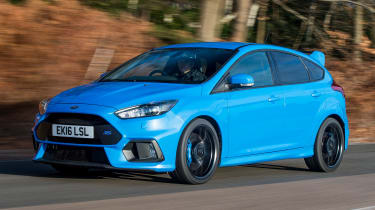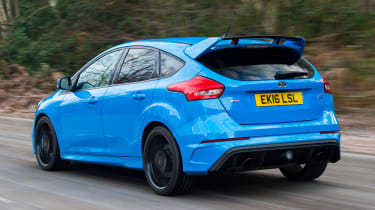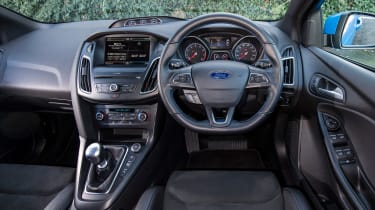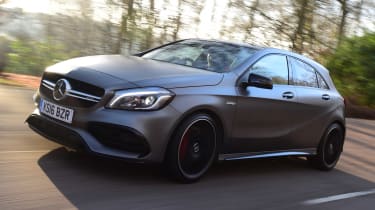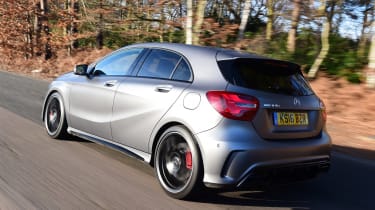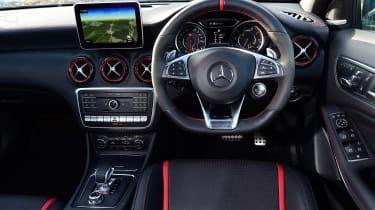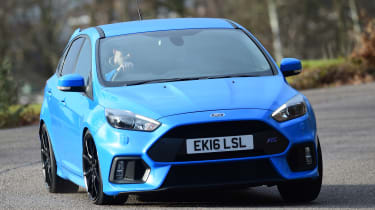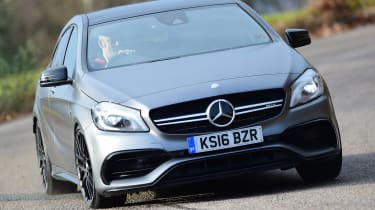Ford Focus RS Mountune vs Mercedes-AMG A 45
Mountune kit aims to give the fast Ford Focus RS an edge over the hot Mercedes-AMG A 45
Forget hot hatchbacks. If you want the fastest, most powerful family five-door, the game has moved on – you’ll need to look towards the realm of the hyper hatch.
Both our test contenders pack an almighty punch. In the blue corner we have the Ford Focus RS, fitted with the Ford Performance by Mountune FPM375 kit, upping power from 345bhp to 370bhp for not much cash.
It faces the Mercedes-AMG A 45. Under its bonnet is the world’s most powerful production four-cylinder turbo engine: a 376bhp 2.0-litre. However, the A 45 costs £9,166 more than the Focus. Is the Mercedes worth the extra for the marginal power gain? Or can the people’s champion pull off yet another victory?
Head-to-head
| Model: | Ford Focus RS Mountune FPM375 | Mercedes-AMG A 45 4MATIC |
| Price: | £32,664 | £41,830 |
| Engine: | 2.3-litre 4cyl turbo | 2.0-litre 4cyl turbo |
| Power/torque: | 370bhp/510Nm | 376bhp/475Nm |
| Transmission: | Six-speed manual, four-wheel drive | Seven-speeed dual-clutch automatic, four-wheel drive |
| 0-60mph | 4.9 seconds | 4.3 seconds |
| Top speed | 166mph | 155mpg |
| Test economy: | 22.8mpg | 19.9mpg |
| CO2/tax: | 175g/km/£210 | 162g/km/£185 |
| Options: | Metallic paint (£745), Luxury Pack (£1,000), 19-inch forged alloy wheels (£975), RS Recaro bucket seats (£1,145), door edge protectors (£85), painted brake calipers (£100 | Designo special metallic paint (£1,795), AMG Dynamic Plus package (£1,395), AMG Night package (£1,595), AMG Performance exhaust (£510), Premium package |
Ford Focus RS Mountune
- • For: Value for money, trick four-wheel-drive tech, FPM375 kit a cost-effective upgrade.
- • Against: Even new SYNC 3 infotainment trails, limited boot space, driving position.
Ford’s Focus RS stole the headlines when we first tested it back at the start of 2016, and a year on the RS has been treated to a boost in power courtesy of the £899 Ford Performance by Mountune FPM375 kit.
As with the Mountune modifications to the Fiesta ST and Focus ST, the upgrades include a new free-flowing air filter and a bespoke ECU map, as well as a new recirculation valve. Combined, these take power from 345bhp to 370bhp. Apart from this, the mechanical make-up is the same, but that’s no bad thing, because the RS’s chassis boasts more than enough grip to contain the extra power.
Alongside the Cosworth-developed 2.3-litre four-cylinder turbo unit’s 370bhp, there’s 510Nm of torque on overboost, which really starts hitting at just over 2,000rpm. There’s a soft edge to the throttle response as the turbo gets up to speed, but once it’s boosting, the performance is savage.
Used - available now

2022 Mercedes
EQA
21,343 milesAutomaticElectric
Cash £23,800
2022 Mercedes
CLA
88,049 milesAutomaticPetrol1.3L
Cash £19,300
2024 BMW
M135i
29,519 milesAutomaticPetrol2.0L
Cash £24,487
2022 Audi
A4
37,569 milesManualPetrol2.0L
Cash £15,887The difference is difficult to notice in any one area as the upgrades have been so well calibrated, but our in-gear performance figures show it’s a match for the Mercedes, accelerating between 50 and 70mph in sixth in 5.3 seconds.
Unfortunately, due to drizzly conditions during our test runs, the RS only managed to sprint from 0-60mph in 4.9 seconds; Ford claims an official time of 4.5 seconds for the upgraded car. But there’s no doubt launch control and the four-wheel-drive system helped. Developed by British firm GKN, it’s a clever unit that can send up to 70 per cent of the engine’s torque to the rear axle, where the rear diff can then divert all of this to just one wheel.
The RS has four driving modes: Normal, Sport, Track and Drift (the car’s party piece). Normal is as you’d expect. Sport sharpens throttle response and initiates some tight, rally car-style cracks and pops from the exhaust when you change gear or lift off. Track and Drift are best used away from the public road, so Ford says, with the latter adding a greater rear bias to the four-wheel-drive system.
Squeeze the throttle before the apex of a bend in second gear and you can feel the RS shift drive to the outside rear wheel as the tail arcs round, tightening the car’s line. While it adds adjustability, it sometimes feels like the Focus is fighting itself. Even so, it’s a clever trick for a front-engined hatch.
Some people might be put off by the RS’s styling, but with its big wing and bodykit it leaves you in no doubt about its performance potential. Inside, material quality is similar to a standard Focus, so it’s robust rather than tactile – but the A-Class’s cabin is no oil painting given its price, either.
Testers’ notes:
Technology: Infotainment can’t match rivals’, whether it’s our Ford’s SYNC 2 or the SYNC 3 in new orders.
Steering: Normal, Sport, Track and Drift modes adjust the weight of the steering and throttle sensitivity.
Materials: Despite its loud exterior styling, inside the RS features the same rather basic but durable material quality as a standard Ford Focus.
Mercedes-AMG A 45
- • For: Blisteringly quick, huge grip, gearbox balances performance and ease of use.
- • Against: Exhaust drones on overrun, interior feel and quality, fuel consumption.
Power and speed were never problems in the previous version of Mercedes-AMG’s performance hatch, but a hike in engine output from 355bhp to 376bhp for this revised A 45 model means it’s got even faster. However, coaxing more power than a Porsche 911 delivers from a 2.0-litre four-cylinder turbo does equate to some lag.
The A 45’s motor stirs at around 1,750rpm and only really wakes up as the rev needle sweeps through to 2,000rpm. By 2,250rpm, where the full 475Nm of torque hits, the A-Class’s engine feels rampant. This shove is sustained to 5,000rpm, with peak power coming in 1,000rpm later.
Compared with the Focus’s flatter-feeling top end, the A 45’s unit rushes to the red line with a keenness that’s unusual for a turbocharged engine. Select Race mode, pull the right shift paddle, and with the £510 AMG Performance exhaust switched on, the A 45 emits an almighty bang as it moves up through the gears.
The shifts are quick on the way up, but coming down the gears the ECU’s slow throttle blip can make the changes feel laboured. Plus, that loud exhaust gives a booming drone on the overrun.However, it offers plenty of theatre with launch control engaged, as the AMG sounds like a rally car sat against its rev limiter. Lift off the brake and the A 45 will punch its way from 0-60mph in an impressive 4.3 seconds, as our test figures show.
As with the Focus, our performance testing was conducted in less than optimum weather conditions; we’d expect both cars to be closer to their official times in the dry (Mercedes claims 0-62mph in 4.2 seconds).
One option we’d definitely choose is the £1,395 AMG Dynamic Plus package. While it seems expensive, the adaptive suspension dampers make the car much more usable every day.
Like the Focus, the A-Class borders on being too firm for most UK surfaces in the sportier setting, while the balance between body control and ride comfort is better for road use in the softer mode.
However, it still thumps over some bumps, and the speed-sensitive steering doesn’t offer as much feedback as the Ford’s purer, fixed-ratio set-up.
The occasionally crashy damping impacts ride quality a little, although the bucket seats do offer lots of support and decent comfort.
In other respects, the A 45 is more usable than the RS, as its larger boot, easier manoeuvrability and better driving position combine to make it more flexible. You just expect better interior quality for the price, with an outdated centre console design and some questionable materials.
Testers’ notes:
Drive: Dual-clutch gearbox gives a performance edge on the Ford, and bucket seats add comfort.
Technology: Mercedes’ eight-inch screen isn’t touch-sensitive and quality of the graphics could be better, but CarPlay and Android Auto are included.
Design: Ergonomics and dash design fall behind rivals, but boot space adds some practicality.
Verdict
First place: Ford Focus RS Mountune
The Mountune-equipped RS nearly matches the punch of the A 45, but costs a lot less. Although it isn’t as practical, that’s not so important with hatchbacks like these. The Focus is more engaging, with as much grip as the AMG but more adjustability. That it’s so much cheaper seals the Mercedes’ fate.
Second place: Mercedes-AMG A 45
There’s no doubting the A 45’s ballistic pace, but this comes at a price. The extra outlay over the Focus is difficult to justify given the quality of the A-Class’s interior. While it’s more practical, it’s more expensive to run. However, the A 45 just isn’t as engaging or as adjustable as the Ford.
